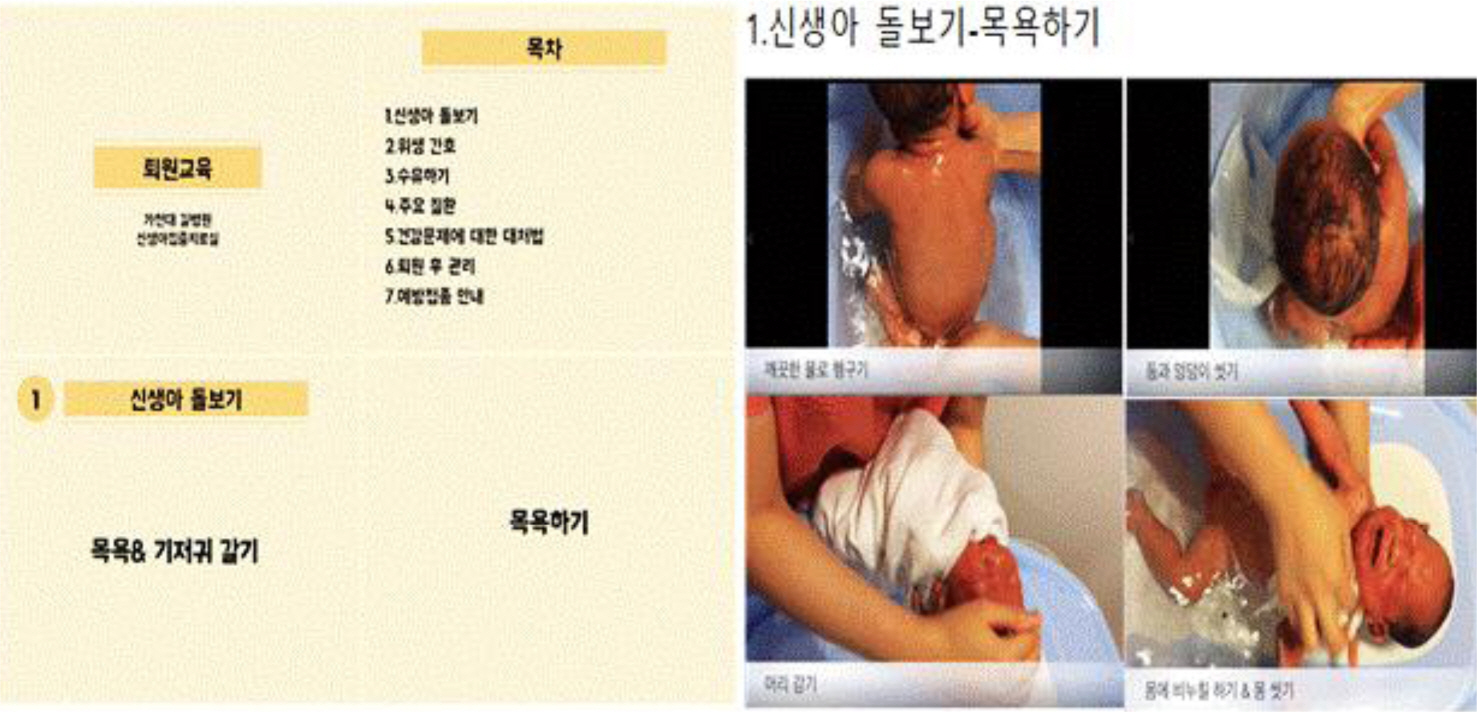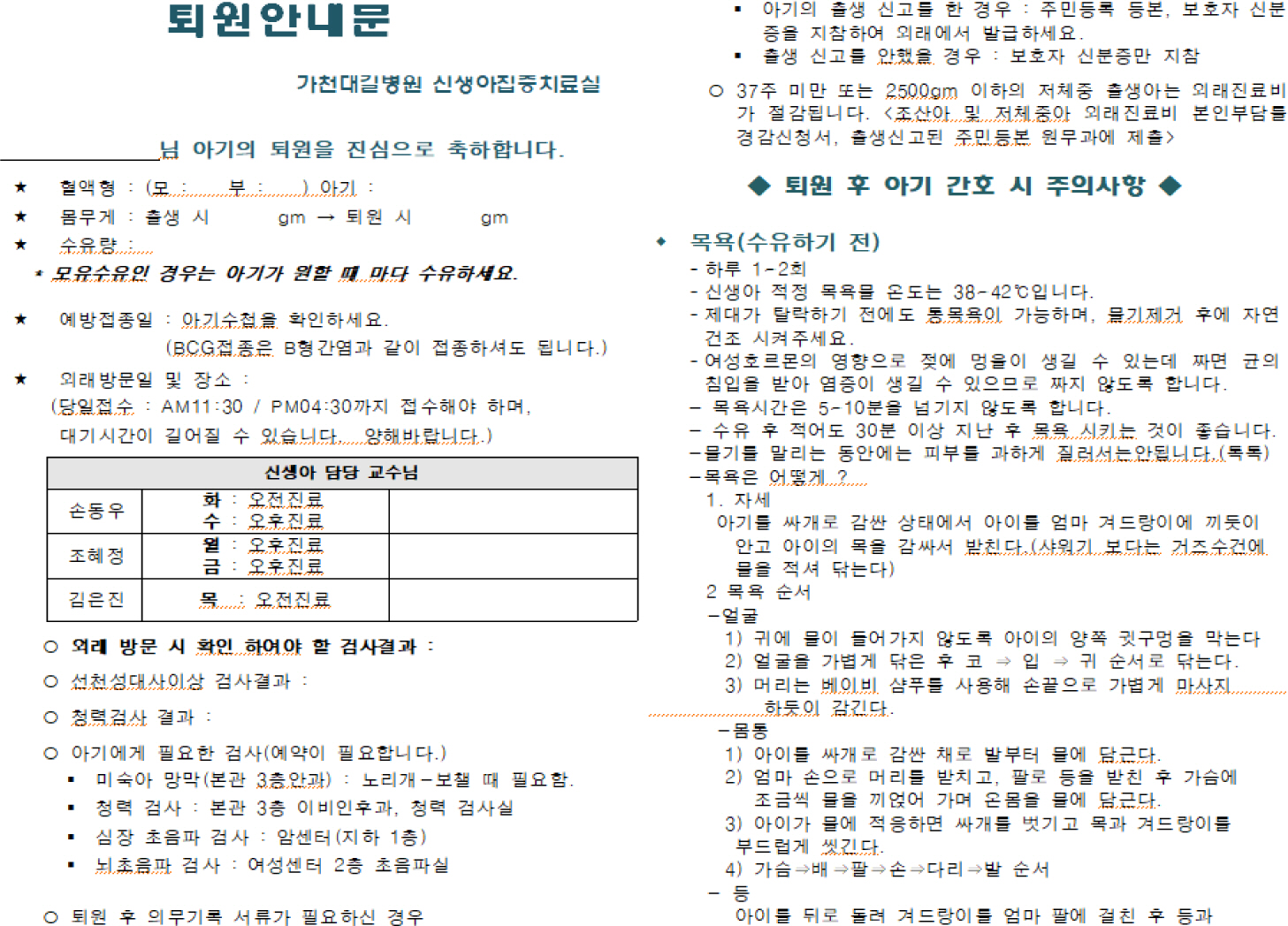J Korean Soc Matern Child Health.
2023 Apr;27(2):71-79. 10.21896/jksmch.2023.27.2.71.
Effects of Systematic Discharge Education Program on Anxiety and Parenting Confidence in Mothers of Premature Infants
- Affiliations
-
- 1Department of Nursing, Gachon University Gil Medical Center, Incheon, Korea
- 2Department of Nursing, Gachon University, Incheon, Korea
- KMID: 2542188
- DOI: http://doi.org/10.21896/jksmch.2023.27.2.71
Abstract
- Purpose
This quasi-experimental single group study aimed to confirm the effects of discharge education using a systematic discharge education program on anxiety and parenting confidence in mothers of premature babies.
Methods
This study conducted discharge education for 3 to 5 days prior to the discharge of 29 mothers of premature babies born in the neonatal intensive care unit. Data were collected between April 1, 2021, to June 30, 2021, and were examined. The hypotheses were analyzed using the Wilcoxon signed-rank test.
Results
Discharge education using a systematic discharge education program was effective in increasing the parenting confidence of mothers with premature babies (z=-3.839, p<0.001). However, it was not effective in reducing anxiety (z=-1.712, p=0.087).
Conclusion
The effects of the systematic discharge education program development and discharge education systematized discharge nursing education, reduced mothers’ anxiety in raising premature babies at home after discharge, and contributed to improving parenting confidence.
Keyword
Figure
Reference
-
Bang KS., Park JS., Kim JY., Park JY., An HS., Yun BH. Literature review on nursing intervention for premature infants in Korea. J Korean Soc Matern Child Health. 2013. 17:49–61. https://doi.org/10.21896/jksmch.2013.17.1.49 .
ArticleChoi EH., Park EY., Park YA., Son YH., Jang MJ. Effect of ambulatory chemotherapy (portable infusion pump use) video education on knowledge, self-efficacy and anxiety of colorectal cancer patients. Asian Oncol Nurs. 2020. 22:193–201. http://doi.org/10.5388/aon.2022.22.3.193 .
ArticleChoi HS., Shin YH. Effects on maternal attachment, parenting stress, and maternal confidence of systematic information for mothers of premature infants. Child Health Nurs Res. 2013. 19:207–15. https://doi.org/10.4094/chnr.2013.19.3.207 .
ArticleDudek-Shriber L. Parent stress in the neonatal intensive care unit and the influence of parent and infant characteristics. Am J Occup Ther. 2004. 58:509–20. https://doi.org/10.5014/ajot.58.5.509 .
ArticleHan KI., Seo KH. Early intervention of low birthweight premature infant after discharge of hospital. Educ J Phys Mult Disabil. 2000. 36:197–215. https://kiss.kstudy.com/Detail/Ar?key=1718222 .Jang YS. Effects of a workbook program on the perceived stress level, maternal role confidence and breast feeding practice of mothers of premature infants. J Korean Acad Nurs. 2005. 35:419–27. https://doi.org/10.4040/jkan.2005.35.2.419 .
ArticleKim JI. The effects of a animation-based support programby nurses on the state anxiety, stress, and maternal identity among mothers of preterm infants [dissertation]. Suwon (Korea): Ajou University;2018. http://www.riss.kr/link?id=T14919071&outLink=K .Kim JS. Parenting experience of prematurity parents based on grounded theory. J Korean Soc Matern Child Health. 2019. 23:232–40. https://doi.org/10.21896/jksmch.2019.23.4.232 .
ArticleKim JS., Shin HS. Effects of a discharge education program using on-line community for parents of premature infants. Child Health Nurs Res. 2010. 16:344–51. https://doi.org/10.4094/jkachn.2010.16.4.344 .
ArticleKim JT., Shin DK. A study based on the standardization of the STAI for Korea. New Med J. 1978. 21:69–75. https://kmbase.medric.or.kr/Main.aspx?d=KMBASE&m=VIEW&i=0378019780210110069 .Kim MJ., Kim TI. Knowledge and performance of developmentally supportive positioning for premature infants among neonatal inten sive care unit nurses. Child Health Nurs Res. 2018. 24:229–40. https://doi.org/10.4094/chnr.2018.24.2.229 .
ArticleKim SY., Kwon MK. A comparative study on infant's temperament & parenting stress by premature & full-term infant's mother. Korean Parent-Child Health J. 2005. 8:123–36. http://www.koreascience.or.kr/article/JAKO200518741149048.page .Kwon HK., Kwon MK. Effect of discharge education program for mothers of premature infants on maternal role confidence and parenting stress. Child Health Nurs Res. 2007. 13:58–65. https://www.e-chnr.org/journal/view.php?number=1304 .Lee JM., Oh SJ., Kim KA., Lee EJ., Lee JY., Hwang MS, et al. Effects of a home-based discharge program for mothers of premature infants on oxygen therapy at home. Child Health Nurs Res. 2010. 16:144–55. https://doi.org/10.4094/jkachn.2010.16.2.144 .
ArticleLee NH. International trends and implications for preterm birth. Health Welfare Policy Forum. 2013. 200:116–27. http://dx.doi.org/10.23062/2013.06.10 .Lee SJ., Choi EK., Park JO., Kim HS. Correlations between a flexible parental visiting environment and parental stress in neonatal intensive care units. Child Health Nurs Res. 2019. 25:377–87. https://doi.org/10.4094/chnr.2019.25.4.377 .
ArticleLundqvist P., Weis J., Sivberg B. Parents’ journey caring for a preterm infant until discharge from hospital‐ based neonatal home care— A challenging process to cope with. J Clin Nurs. 2019. 28:2966–78. https://doi.org/10.1111/jocn.14891 .
ArticlePace CC., Spittle AJ., Molesworth CM., Lee KJ., Northam EA., Cheong JL, et al. Evolution of depression and anxiety symptoms in parents of very preterm infants during the newborn period. JAMA Pediatr. 2016. 170:863–70. https://doi.org/10.1001/jamapediatrics.2016.0810 .
ArticlePark MS. A Comparative on primiparas' self Confidence of taking care of neonates between rooming-in and conventional group [dissertation]. Seoul (Korea): Korea University;1991.Pharis ME. Age and sex differences in expectations for infants and the parenting role among couples in a first pregnancy and among university students [dissertation]. Austin (TX): Texas University;1978. https://www.proquest.com/openview/0f56ff6a3c615d7e0ad6437087fcc41a/1?pq-origsite=gscholar&cbl=18750&diss=y .Shin YH. Current status of Korean premature infant care and its prospective. Child Health Nurs Res. 2013. 9:96–106. https://koreascience.kr/article/JAKO200316642158535.page .Shin YH., Lim JH., Kim GE. Effects of maternal empowerment program on stress, anxiety, depression and parenting confidence in mothers of preterm infants in the neonatal intensive care unit. Child Health Nurs Res. 2018. 24:252–61. https://doi.org/10.4094/chnr.2018.24.2.252 .
ArticleSong HS. Effect of premature infant care education on anxiety, maternal-fetal attachment behaviors, and maternal confidence of pregnant women in the maternal-fetal intensive care unit [dissertation]. Gwangju (Korea): Chonnam University;2020. http://www.riss.kr/search/detail/DetailView.do?p_mat_type=be54d9b8bc7cdb09&control_no=3026443b410decdeffe0bdc3ef48d419&keyword=%EC%86%A1%ED%98%84%EC%88%9C_%20%EC%9E%90%EC%8B%A0%EA%B0%90 .Spielberger CD., Gonzalez-Reigosa F., Martinez-Urrutia A., Natalicio LF., Natalicio DS. The state-trait anxiety inventory. Int J Psychol. 1971. 5:145–58.Statistics Korea. Cause of birth statistics in 2021 [Internet]. Daejeon (Korea): Statistics Korea;2021. [cited 2022 Jan 20]. Available from: http://kostat.go.kr/portal/eng/pressReleases/8/10/index.board?bmode=read&bSeq=&aSeq=420358&pageNo=1&rowNum=10&navCount=10&cu .Sung MH. Study on the perceived stress degree and content of mother of high-risk infants in neonatal intensive care unit. Child Health Nurs Res. 2002. 8:97–109. https://www.kci.go.kr/kciportal/ci/sereArticleSearch/ciSereArtiView.kci?sereArticleSearchBean.artiId=ART000853013 .Valizadeh L., Hosseini MB., Damanabad ZH. Effect of NICU Department Orientation Program on mother's anxiety: a randomized clinical trial. J Caring Sci. 2016. 5:205–14. https://doi.org/10.15171/jcs.2016.022 .
Article
- Full Text Links
- Actions
-
Cited
- CITED
-
- Close
- Share
- Similar articles
-
- Effect of Discharge Education Program for Mothers of Premature Infants on Maternal Role Confidence and Parenting Stress
- Effects on Maternal Attachment, Parenting Stress, and Maternal Confidence of Systematic Information for Mothers of Premature Infants
- Effects of a Discharge Education Program Using On-line Community for Parents of Premature Infants
- Effects of an Infant Care Education Program for Mothers of Late-preterm Infants on Parenting Confidence, Breastfeeding Rates, and Infants' Growth and Readmission Rates
- Effects of a Home-based Discharge Program for Mothers of Premature Infants on Oxygen Therapy at Home



